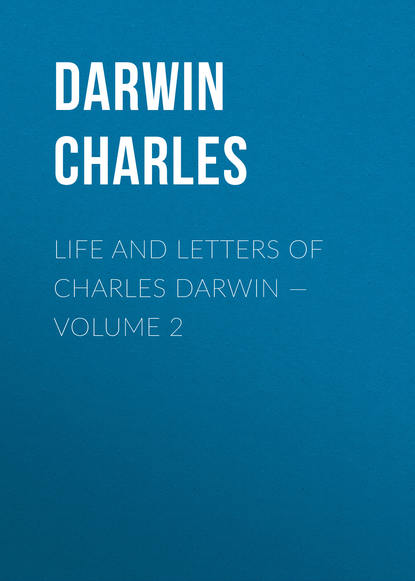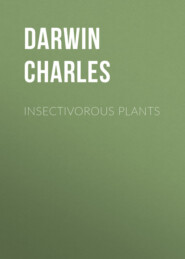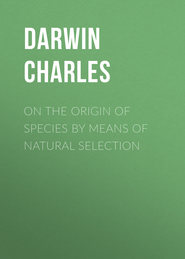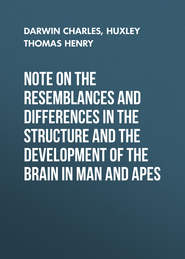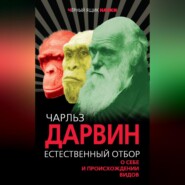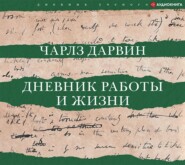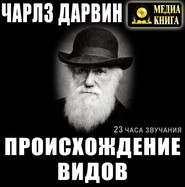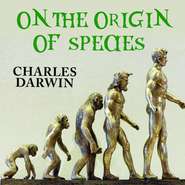По всем вопросам обращайтесь на: info@litportal.ru
(©) 2003-2024.
✖
Life and Letters of Charles Darwin — Volume 2
Настройки чтения
Размер шрифта
Высота строк
Поля
Mr. Torbitt tells me that he still (1887) succeeds in raising varieties possessing well-marked powers of resisting disease; but this immunity is not permanent, and, after some years, the varieties become liable to the attacks of the fungus.]
THE KEW INDEX OF PLANT-NAMES, OR 'NOMENCLATOR DARWINIANUS.'
[Some account of my father's connection with the Index of Plant-names now (1887) in course of preparation at Kew will be found in Mr. B. Daydon Jackson's paper in the 'Journal of Botany,' 1887, page 151. Mr. Jackson quotes the following statement by Sir J.D. Hooker: —
"Shortly before his death, Mr. Charles Darwin informed Sir Joseph Hooker that it was his intention to devote a considerable sum of money annually for some years in aid or furtherance of some work or works of practical utility to biological science, and to make provisions in his will in the event of these not being completed during his lifetime.
"Amongst other objects connected with botanical science, Mr. Darwin regarded with especial interest the importance of a complete index to the names and authors of the genera and species of plants known to botanists, together with their native countries. Steudel's 'Nomenclator' is the only existing work of this nature, and although now nearly half a century old, Mr. Darwin had found it of great aid in his own researches. It has been indispensable to every botanical institution, whether as a list of all known flowering plants, as an indication of their authors, or as a digest of botanical geography."
Since 1840, when the 'Nomenclator' was published, the number of described plants may be said to have doubled, so that the 'Nomenclator' is now seriously below the requirements of botanical work. To remedy this want, the 'Nomenclator' has been from time to time posted up in an interleaved copy in the Herbarium at Kew, by the help of "funds supplied by private liberality." (Kew Gardens Report, 1881, page 62.)
My father, like other botanists, had as Sir Joseph Hooker points out, experienced the value of Steudel's work. He obtained plants from all sorts of sources, which were often incorrectly named, and he felt the necessity of adhering to the accepted nomenclature, so that he might convey to other workers precise indications as to the plants which he had studied. It was also frequently a matter of importance to him to know the native country of his experimental plants. Thus it was natural that he should recognize the desirability of completing and publishing the interleaved volume at Kew. The wish to help in this object was heightened by the admiration he felt for the results for which the world has to thank the Royal Gardens at Kew, and by his gratitude for the invaluable aid which for so many years he received from its Director and his staff. He expressly stated that it was his wish "to aid in some way the scientific work carried on at the Royal Gardens" (Kew Gardens Report, 1881, page 62.) — which induced him to offer to supply funds for the completion of the Kew 'Nomenclator.'
The following passage, for which I am indebted to Professor Judd, is of much interest, as illustrating the motives that actuated my father in this matter. Professor Judd writes: —
"On the occasion of my last visit to him, he told me that his income having recently greatly increased, while his wants remained the same, he was most anxious to devote what he could spare to the advancement of Geology or Biology. He dwelt in the most touching manner on the fact that he owed so much happiness and fame to the natural-history sciences, which had been the solace of what might have been a painful existence; — and he begged me, if I knew of any research which could be aided by a grant of a few hundreds of pounds, to let him know, as it would be a delight to him to feel that he was helping in promoting the progress of science. He informed me at the same time that he was making the same suggestion to Sir Joseph Hooker and Professor Huxley with respect to Botany and Zoology respectively. I was much impressed by the earnestness, and, indeed, deep emotion, with which he spoke of his indebtedness to Science, and his desire to promote its interests."
Sir Joseph Hooker was asked by my father "to take into consideration, with the aid of the botanical staff at Kew and the late Mr. Bentham, the extent and scope of the proposed work, and to suggest the best means of having it executed. In doing this, Sir Joseph had further the advantage of the great knowledge and experience of Professor Asa Gray, of Cambridge, U.S.A., and of Mr. John Ball, F.R.S." ('Journal of Botany,' loc. cit.)
The plan of the proposed work having been carefully considered, Sir Joseph Hooker was able to confide its elaboration in detail to Mr. B. Daydon Jackson, Secretary of the Linnean Society, whose extensive knowledge of botanical literature qualifies him for the task. My father's original idea of producing a modern edition of Steudel's 'Nomenclator' has been practically abandoned, the aim now kept in view is rather to construct a list of genera and species (with references) founded on Bentham and Hooker's 'Genera Plantarum.' The colossal nature of the work in progress at Kew may be estimated by the fact that the manuscript of the 'Index' is at the present time (1887) believed to weigh more than a ton. Under Sir Joseph Hooker's supervision the work goes steadily forward, being carried out with admirable zeal by Mr. Jackson, who devotes himself unsparingly to the enterprise, in which, too, he has the advantage of the active interest in the work felt by Professor Oliver and Mr. Thiselton Dyer.
The Kew 'Index,' which will, in all probability, be ready to go to press in four or five years, will be a fitting memorial of my father: and his share in its completion illustrates a part of his character — his ready sympathy with work outside his own lines of investigation — and his respect for minute and patient labour in all branches of science.]
CHAPTER 2.XVI. — CONCLUSION
Some idea of the general course of my father's health may have been gathered from the letters given in the preceding pages. The subject of health appears more prominently than is often necessary in a Biography, because it was, unfortunately, so real an element in determining the outward form of his life.
During the last ten years of his life the condition of his health was a cause of satisfaction and hope to his family. His condition showed signs of amendment in several particulars. He suffered less distress and discomfort, and was able to work more steadily. Something has been already said of Dr. Bence Jones's treatment, from which my father certainly derived benefit. In later years he became a patient of Sir Andrew Clark, under whose care he improved greatly in general health. It was not only for his generously rendered service that my father felt a debt of gratitude towards Sir Andrew Clark. He owed to his cheering personal influence an ofte-repeated encouragement, which laterally added something real to his happiness, and he found sincere pleasure in Sir Andrew's friendship and kindness towards himself and his children.
Scattered through the past pages are one or two references to pain or uneasiness felt in the region of the heart. How far these indicate that the heart was affected early in life, I cannot pretend to say; in any case it is certain that he had no serious or permanent trouble of this nature until shortly before his death. In spite of the general improvement in his health, which has been above alluded to, there was a certain loss of physical vigour occasionally apparent during the last few years of his life. This is illustrated by a sentence in a letter to his old friend Sir James Sulivan, written on January 10, 1879: "My scientific work tires me more than it used to do, but I have nothing else to do, and whether one is worn out a year or two sooner or later signifies but little."
A similar feeling is shown in a letter to Sir J.D. Hooker of June 15, 1881. My father was staying at Patterdale, and wrote: "I am rather despondent about myself... I have not the heart or strength to begin any investigation lasting years, which is the only thing which I enjoy, and I have no little jobs which I can do."
In July, 1881, he wrote to Mr. Wallace, "We have just returned home after spending five weeks on Ullswater; the scenery is quite charming, but I cannot walk, and everything tires me, even seeing scenery... What I shall do with my few remaining years of life I can hardly tell. I have everything to make me happy and contented, but life has become very wearisome to me." He was, however, able to do a good deal of work, and that of a trying sort (On the action of carbonate of ammonia on roots and leaves.), during the autumn of 1881, but towards the end of the year he was clearly in need of rest; and during the winter was in a lower condition than was usual with him.
On December 13 he went for a week to his daughter's house in Bryanston Street. During his stay in London he went to call on Mr. Romanes, and was seized when on the door-step with an attack apparently of the same kind as those which afterwards became so frequent. The rest of the incident, which I give in Mr. Romanes' words, is interesting too from a different point of view, as giving one more illustration of my father's scrupulous consideration for others: —
"I happened to be out, but my butler, observing that Mr. Darwin was ill, asked him to come in, he said he would prefer going home, and although the butler urged him to wait at least until a cab could be fetched, he said he would rather not give so much trouble. For the same reason he refused to allow the butler to accompany him. Accordingly he watched him walking with difficulty towards the direction in which cabs were to be met with, and saw that, when he had got about three hundred yards from the house, he staggered and caught hold of the park-railings as if to prevent himself from falling. The butler therefore hastened to his assistance, but after a few seconds saw him turn round with the evident purpose of retracing his steps to my house. However, after he had returned part of the way he seems to have felt better, for he again changed his mind, and proceeded to find a cab."
During the last week of February and in the beginning of March, attacks of pain in the region of the heart, with irregularity of the pulse, became frequent, coming on indeed nearly every afternoon. A seizure of this sort occurred about March 7, when he was walking alone at a short distance from the house; he got home with difficulty, and this was the last time that he was able to reach his favourite 'Sand-walk.' Shortly after this, his illness became obviously more serious and alarming, and he was seen by Sir Andrew Clark, whose treatment was continued by Dr. Norman Moore, of St. Bartholomew's Hospital, and Mr. Alfrey, of St. Mary Cray. He suffered from distressing sensations of exhaustion and faintness, and seemed to recognise with deep depression the fact that his working days were over. He gradually recovered from this condition, and became more cheerful and hopeful, as is shown in the following letter to Mr. Huxley, who was anxious that my father should have closer medical supervision than the existing arrangements allowed:
Down, March 27, 1882.
My dear Huxley,
Your most kind letter has been a real cordial to me. I have felt better to-day than for three weeks, and have felt as yet no pain. Your plan seems an excellent one, and I will probably act upon it, unless I get very much better. Dr. Clark's kindness is unbounded to me, but he is too busy to come here. Once again, accept my cordial thanks, my dear old friend. I wish to God there were more automata (The allusion is to Mr. Huxley's address 'On the Hypothesis that Animals are Automata, and its History,' given at the Belfast meeting of the British Association in 1874, and republished in 'Science and Culture.') in the world like you.
Ever yours, CH. DARWIN."
The allusion to Sir Andrew Clark requires a word of explanation. Sir Andrew Clark himself was ever ready to devote himself to my father, who, however, could not endure the thought of sending for him, knowing how severely his great practice taxed his strength.
No especial change occurred during the beginning of April, but on Saturday 15th he was seized with giddiness while sitting at dinner in the evening, and fainted in an attempt to reach his sofa. On the 17th he was again better, and in my temporary absence recorded for me the progress of an experiment in which I was engaged. During the night of April 18th, about a quarter to twelve, he had a severe attack and passed into a faint, from which he was brought back to consciousness with great difficulty. He seemed to recognise the approach of death, and said, "I am not the least afraid to die." All the next morning he suffered from terrible nausea and faintness, and hardly rallied before the end came.
He died at about four o'clock on Wednesday, April 19th, 1882, in the seventy-fourth year of his age.
I close the record of my father's life with a few words of retrospect added to the manuscript of his 'Autobiography' in 1879: —
"As for myself, I believe that I have acted rightly in steadily following, and devoting my life to Science. I feel no remorse from having committed any great sin, but have often and often regretted that I have not done more direct good to my fellow creatures."
APPENDIX I
THE FUNERAL IN WESTMINSTER ABBEY
On the Friday succeeding my father's death, the following letter, signed by twenty members of Parliament, was addressed to Dr. Bradley, Dean of Westminster: —
HOUSE OF COMMONS, April 21, 1882.
Very Rev. Sir,
We hope you will not think we are taking a liberty if we venture to suggest that it would be acceptable to a very large number of our fellow-countrymen of all classes and opinions that our illustrious countryman, Mr. Darwin, should be buried in Westminster Abbey.
We remain, your obedient servants,
JOHN LUBBOCK, NEVIL STOREY MASKELYNE, A.J. MUNDELLA, G.O. TREVELYAN, LYON PLAYFAIR, CHARLES W. DILKE, DAVID WEDDERBURN, ARTHUR RUSSEL, HORACE DAVEY, BENJAMIN ARMITAGE, RICHARD B. MARTIN, FRANCIS W. BUXTON, E.L. STANLEY, HENRY BROADHURST, JOHN BARRAN, F.J. CHEETHAM, H.S. HOLLAND, H. CAMPBELL-BANNERMAN, CHARLES BRUCE, RICHARD FORT.
The Dean was abroad at the time, and telegraphed his cordial acquiescence.
The family had desired that my father should be buried at Down: with regard to their wishes, Sir John Lubbock wrote: —
HOUSE OF COMMONS, April 25, 1882.
My dear Darwin,
I quite sympathise with your feeling, and personally I should greatly have preferred that your father should have rested in Down amongst us all. It is, I am sure, quite understood that the initiative was not taken by you. Still, from a national point of view, it is clearly right that he should be buried in the Abbey. I esteem it a great privilege to be allowed to accompany my dear master to the grave.
Believe me, yours most sincerely,
JOHN LUBBOCK. W.E. DARWIN, ESQ.
The family gave up their first-formed plans, and the funeral took place in Westminster Abbey on April 26th. The pall-bearers were: —
SIR JOHN LUBBOCK,
MR. HUXLEY,
MR. JAMES RUSSELL LOWELL (American Minister),
MR. A.R. WALLACE,





